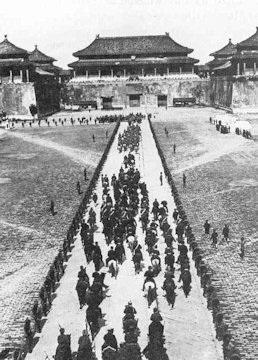
|
Boxer Rebellion of 1899-1901 - Page 1
There was a Chinese nationalist uprising in 1899-1900 against foreigners, the
representatives of alien powers, and Chinese Christians. Expulsion of all
foreigners from China was the ultimate objective of the uprising. The name
Boxers (Yi He Quan) refers to "The Society of the Righteous and Harmonious
Fist," a loose English translation of a Chinese term also meaning "righteous
harmony band." In 1899 the Boxers, a secret society of Chinese, began a
campaign of terror against Christian missionaries in the northeastern
provinces. Although the Boxers were officially denounced, they were
secretly supported by many of the royal court, including the dowager
empress Cixi (Tz'u Hsi). Economic and political exploitation of
China by various Western powers and Japan and humiliating military
defeats inflicted by Great Britain in the Opium War (1840-1842) and by Japan
in the Sino-Japanese War (1894-95) were the main causes of Chinese
resentment.
They made a movie of the event, called "55 Days in Peking," starring Charleton Heston. |